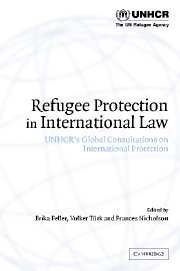Book contents
- Frontmatter
- Contents
- List of annexes
- Notes on contributors and editors
- Foreword
- Preface
- Acknowledgments
- Expert roundtables and topics under the ‘second track’ of the Global Consultations
- Table of cases
- Table of treaties and other international instruments
- List of abbreviations
- Part 1 Introduction
- Part 2 Non-refoulement (Article 33 of the 1951 Convention)
- Part 3 Illegal entry (Article 31)
- Part 4 Membership of a particular social group (Article 1A(2))
- Part 5 Gender-related persecution (Article 1A(2))
- Part 6 Internal protection/relocation/flight alternative
- 6.1 Internal protection/relocation/flight alternative as an aspect of refugee status determination
- 6.2 Summary Conclusions: internal protection/relocation/flight alternative, expert roundtable, San Remo, September 2001
- 6.3 List of participants
- Part 7 Exclusion (Article 1F)
- Part 8 Cessation (Article 1C)
- Part 9 Family unity (Final Act, 1951 UN Conference)
- Part 10 Supervisory responsibility (Article 35)
- Index
6.1 - Internal protection/relocation/flight alternative as an aspect of refugee status determination
Published online by Cambridge University Press: 28 August 2009
- Frontmatter
- Contents
- List of annexes
- Notes on contributors and editors
- Foreword
- Preface
- Acknowledgments
- Expert roundtables and topics under the ‘second track’ of the Global Consultations
- Table of cases
- Table of treaties and other international instruments
- List of abbreviations
- Part 1 Introduction
- Part 2 Non-refoulement (Article 33 of the 1951 Convention)
- Part 3 Illegal entry (Article 31)
- Part 4 Membership of a particular social group (Article 1A(2))
- Part 5 Gender-related persecution (Article 1A(2))
- Part 6 Internal protection/relocation/flight alternative
- 6.1 Internal protection/relocation/flight alternative as an aspect of refugee status determination
- 6.2 Summary Conclusions: internal protection/relocation/flight alternative, expert roundtable, San Remo, September 2001
- 6.3 List of participants
- Part 7 Exclusion (Article 1F)
- Part 8 Cessation (Article 1C)
- Part 9 Family unity (Final Act, 1951 UN Conference)
- Part 10 Supervisory responsibility (Article 35)
- Index
Summary
Introduction
In many jurisdictions around the world, the possibility of an ‘internal flight alternative’ (IFA) (often referred to as ‘internal relocation alternative’) is invoked to deny refugee status to persons at risk of being persecuted for a Convention reason in part, but not all, of their country of origin. In this, as in so man areas of refugee law and policy, the viability of a universal commitment to protection is challenged by divergence in State practice. The goals of this paper are therefore, first, briefly to review the origins and development of the practice of considering IFA as an aspect of the refugee status determination process; secondly, to identify key protection concerns in leading formulations of the IFA rule; and, thirdly, to propose relevant substantive and procedural standards which recognize the legal plausibility in some circumstances of considering internal protection alternatives, but which we believe avoid most of the protection pitfalls of current practice and doctrine.
For the sake of clarity, we refer to the ‘best standard’ approach proposed in this paper as the ‘internal protection alternative’ (IPA), a form of words which more precisely captures the essence of the permissible range of State discretion. In short, we believe that refugee status may not lawfully be denied simply because the asylum seeker ought first to have attempted to flee within his or her own State, nor even on the grounds that it would presently be possible for the applicant to secure ‘safety’ in the home country by relocating internally.
- Type
- Chapter
- Information
- Refugee Protection in International LawUNHCR's Global Consultations on International Protection, pp. 357 - 417Publisher: Cambridge University PressPrint publication year: 2003
- 8
- Cited by



